Positive Energy
Renewable energy experts discuss government and corporate responses to the public’s increasing demand for natural resources
Michael Kotutwa Johnson (MPP ’03) begins each day by remembering a powerful fact: that although today Indigenous Peoples constitute less than five percent of the world’s population, they have been protecting 80 percent of the Earth’s biodiversity on a mere 25 percent of the land. As the program officer at the Native American Agriculture Fund, a private charitable organization, Johnson—a member of the Hopi tribe located in northern Arizona and a 250th generation dryland crop farmer—is often requested to offer advice to tribal, state, and federal governments in agricultural ventures and renewable energy proposals, such as wind and solar farms.
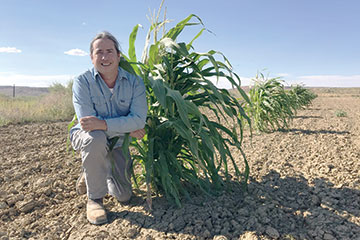
“Considering these statistics, the voices of Native Americans belong at the forefront of making clean energy changes to tribal lands,” explains Johnson, who constructed his own renewable-energy home adjacent to his non-irrigated corn, melon, and squash fields. “My seat at the table, which is primarily granted to me because of my education level, allows me to help develop equitable solutions, highlight Indian Country’s biodiversity, and partner with renewable energy companies.”
This biodiversity, which has resulted in living species of wildlife found nowhere else in the country except on tribal lands, is part of environmentally friendly Indigenous land management schemes derived from clean energy values like working only with what the environment naturally provides. Such schemes have been practiced by Indigenous Peoples for millennia. While Indigenous methods have allowed Native Americans to survive in their environmental surroundings, they have also provided the rest of the nation with additional options for healthy foods that have been produced using what are commonly referred to as regenerative practices.
In Johnson’s experience, discussions about renewable energy policies between Native Americans and the government also highlight issues derived from past mistrust of state and federal governments. While representing the best interest of local tribes, Johnson must be cautious to never exploit Native traditions while employing Western language to explain certain farm-specific clean energy techniques and benefits. Often, however, these traditional practices are not validated or accepted by government agencies who rely solely on scientific criteria often without considering supplemental expert testimonials to approve funding for renewable energy programs— despite thousands of years of proven success.
Native Americans are also frequently excluded from conversations about renewable energy at the federal level because their populations are typically omitted from national data collection surveys focused on climate and weather conditions. Without a presence in national data, government agencies are unaware of their needs, further disqualifying them from receiving funding for renewable energy programs.
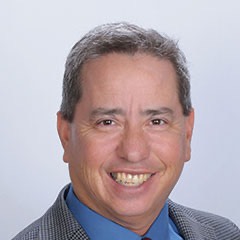
“It’s critical to invite more Native Americans to share their knowledge when renewable energy policies are being developed and to keep in mind that our demographic includes scientists and researchers as well as farmers,” shares Johnson. “We have a vested interest in this area, but the difference is that our education has been acquired differently. We tend to learn more from elders that we know rather than from scholars we don’t know.”
To help improve such communications, Johnson recommends streamlining government processes to increase the inclusion of diverse perspectives. With additional representation, and therefore increased potential and opportunity for renewable energy farming methods, Johnson hopes that tribal landowners will develop local clean-energy food-processing infrastructures so that children and families can continue to benefit from sustainably grown produce.
“I want to create something that can help everybody,” he says. “I am advocating for a complete restoration of the Native American food system through conservation and Indigenous land management schemes as a way to fulfill this request.”
“It’s a dynamic space that is constantly moving and evolving, which is exciting because
no two days are ever the same,” shares Kelley Smith Burk (MPP ’04) about her career as the director for the Office of Energy located within the Florida
Department of Agriculture and Consumer Services. While all 50 American states and
territories have some variation of the office of energy, Florida is the only state
that houses this office within its Department of Agriculture and Consumer Services—a
strategic placement that began in 2011 as a way for the state to allocate renewable
energy resources to its three largest economic drivers: agriculture, tourism, and
construction.
Through this organizational change, Smith Burk continually collaborates with other state departments, local government agencies, utilities companies, and community members interested in sharing their concerns and solutions around the increasing demand for renewable energy sources built into public and private properties. In fact, Smith Burk points out that just five years ago only two percent of Florida’s energy was renewable, compared to the current 7.3 percent and projected 22.8 percent in the next 10 years.
“Renewable energy isn’t just putting a solar panel on a roof. You have to assess whether the technologies you want to apply fit the location, and that takes multiple communications with numerous stakeholders,” Smith Burk says. “We listen to people’s stories, explore what projects would make the most sense for them, and develop pilot programs to see what works."
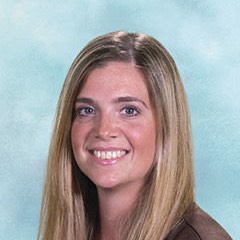
While certain programs sometimes prove more effective and valuable than originally expected, some projects result in highlighting where improvements must be made and how to solve existing issues in new ways. One critical need that her office has successfully met is helping make renewable energy more accessible and affordable to underserved communities in Florida. “There are many low-income neighborhoods that don’t have the money to launch the programs they want, and my office fills those gaps with our funding to ensure that they receive the attention they require and that no community gets left behind,” she says.
In consideration of the state’s tumultuous weather conditions during hurricane season, Smith Burk also partners with legislators to discuss how the loss of fossil fuel energy can be replaced in the event of a disaster. She examines, for example, how electricity can be supplied for a week following a power outage after a hurricane and whether enough renewable energy systems exist to sustain schools, hospitals, and emergency shelters in the event of a major disaster.
During such discussions, Smith Burk notes that goal-setting and program development involve a variety of factors, including geography, resource availability, political systems, and environmental issues. In determining the future of renewable energy, Smith Burk emphasizes the importance of continuing to educate and train young people in the field—including the academic, public policy, research and development, utility, and vehicle manufacturing arenas—because energy impacts every single area of our lives.
“Not having the proper energy to turn on the lights, start a car, join a Zoom call, or power our mobile devices will lead to huge issues,” Smith Burk warns. “Investing in future generations who are coming into this field through internships and entry-level positions is critical because our jobs require positive relationships and effective communication between diverse entities, and we must prepare incoming employees to help the world in innovative, intelligent, and compassionate ways.”
Power House
Nobel Chang (’14, MBA ’15), cofounder and managing partner at Palladium Energy Development, LLC, embraced his journey into renewable energy 12 years ago by being part of a team that developed an off-grid wind-, solar-, and battery-energy system designed to provide power to places without access to electricity in rural Asia and Africa. Realizing he could help improve people’s lives fueled his love of renewable energy—a passion that has only grown with the worsening state of climate change and its environmental impact.
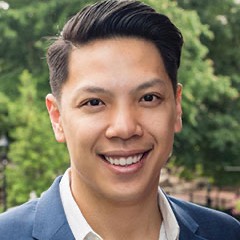
Initially launched with two business partners and two rounds of capital, Palladium, a privately held company that is developing and financing 500 megawatts of utility-scale solar and solar plus storage projects across the United States, continues to invest in and evaluate a wide range of renewable technologies and fuels, such as green hydrogen, stand-alone storage, and pumped storage hydropower with the goal of providing a reliable, round-the-clock source of renewable energy.
While the cost of solar energy made its usage an exclusive luxury in its early days, new technologies have since been developed for renewables to be competitive with conventional sources of power. The cost of installing new solar and wind farms has fallen drastically while efficiency has improved exponentially through continuous innovation. “There is a myth that solar energy is expensive, but it is now cheaper to build new solar systems than to run existing coal plants,” Chang reveals. “In fact, 2020 was a record-breaking year for solar energy because it’s not just about the environment anymore—it’s about making financial sense.”
Chang shares that he has never been more optimistic about renewable energy development and predicts that innovations will continue as demand increases among academic institutions, government agencies, corporations, and utilities companies. Continuing on this path, however, comes with its unique set of obstacles.
“As an industry, we face a multitude of challenges from community opposition to wavering legislative and regulatory policies to rising costs of interconnecting into the grid to supply chain issues,” Chang says. “Developing successful projects takes a team of talented and dedicated people with an aligned goal of building renewable energy against all odds.”
He remains optimistic about the real impact the people of the renewable energy industry can make. “I have witnessed firsthand the sheer power of the creativity and tenacity of the people behind the renewable energy transition,” Chang says. “There is no issue that we, as a collective, are unable to solve. We are part of something that’s bigger than we are as individuals.”
Firm Beliefs
“Energy laws are some of the oldest federal laws in the United States, and not much has changed since the days of the oil barons in the 1930s,” explains Jennifer Brough (JD ’07), an attorney who advises pipeline, electric, and renewable energy companies on corporate matters, often representing them before federal agencies such as the United States Department of Energy and the Federal Energy Regulatory Commission.
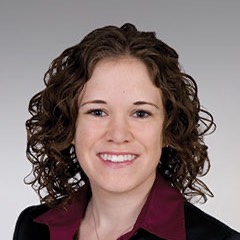
“Both corporations and federal agencies want to hear straight talk,” she says about communicating with state and federal agencies on behalf of her clients. “Lawyers who dance around issues or raise problems without offering solutions pose more of a hindrance than assistance.”
As laws regarding the development of new energy infrastructures change with each presidential administration—which means legislators must continually work to adapt to updated laws and regulations of yet another new era—Brough must also diligently keep abreast of such policy shifts to strategically guide her clients on how to bring their projects to fruition.
According to Brough, while companies were previously resistant to investing in greener technologies, wider access to renewable energy sources— such as natural gas pipelines accepting natural gas from sources like animal waste—has caused a shift in corporate behavior toward more creative solutions. “The industry is adapting and open to change like never before, and we are now witnessing much more flexibility and creativity in changing to renewable sources,” she says.
A partner at Locke Lord, an international full-service law firm that specializes in complex litigation, regulatory compliance, and transactional negotiations, Brough has learned that many companies assume that as renewable energy sources become more popular, the world’s reliance on fossil fuels will soon come to an end.
“While we have made incredible strides in renewable energy storage and delivery, there is much more work to be done,” Brough says. "If we accept the reality that fossil fuels are part of the energy transition, we can make smarter decisions about reducing emissions and constructing energy projects in a more environmentally acceptable manner."
